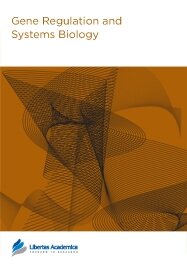

Publication Date: 24 Nov 2008
Journal: Gene Regulation and Systems Biology

1Department of Cell and Molecular Biology, Karolinska Institutet, Stockholm, Sweden. 2Current address Department of Research, Childhood leukemia Group, University Hospital Basel, Basel, Switzerland. 3Current address Institute for Research in Immunology and Cancer (IRIC), Université de Montréal, Montréal, Canada.
Abstract
Tripeptidyl-peptidase II (TPPII) is a serine peptidase highly expressed in malignant Burkitt’s lymphoma cells (BL). We have previously shown that overexpression of TPPII correlates with chromosomal instability, centrosomal and mitotic spindle abnormalities and resistance to apoptosis induced by spindle poisons. Furthermore, TPPII knockdown by RNAi was associated with endoreplication and the accumulation of polynucleated cells that failed to complete cell division, indicating a role of TPPII in the cell cycle. Here we have applied a global approach of gene expression analysis to gain insights on the mechanism by which TPPII regulates this phenotype. mRNA profiling of control and TPPII knockdown BL cells identified one hundred and eighty five differentially expressed genes. Functional categorization of these genes high- lighted major physiological functions such as apoptosis, cell cycle progression, cytoskeleton remodeling, proteolysis, and signal transduction. Pathways and protein interactome analysis revealed a significant enrichment in components of MAP kinases signaling. These findings suggest that TPPII infl uences a wide network of signaling pathways that are regulated by MAPKs and exerts thereby a pleiotropic effect on biological processes associated with cell survival, proliferation and genomic instability.
PDF (2.82 MB PDF FORMAT)
RIS citation (ENDNOTE, REFERENCE MANAGER, PROCITE, REFWORKS)
BibTex citation (BIBDESK, LATEX)
XML
PMC HTML
Since my first enquiry about publishing in Gene Regulation And Systems Biology until the last moment of completing all the steps for publishing my paper, I was always taken seriously as author. All my questions and concerns were answered in a very professional way. The review process was quick and very fair. Reviewers stick to the facts and declare their points of view like a clear thread through the manuscript. I always had an enthusiastic ...

All authors are surveyed after their articles are published. Authors are asked to rate their experience in a variety of areas, and their responses help us to monitor our performance. Presented here are their responses in some key areas. No 'poor' or 'very poor' responses were received; these are represented in the 'other' category.See Our Results
Copyright © 2013 Libertas Academica Ltd (except open access articles and accompanying metadata and supplementary files.)
FacebookGoogle+Twitter
PinterestTumblrYouTube